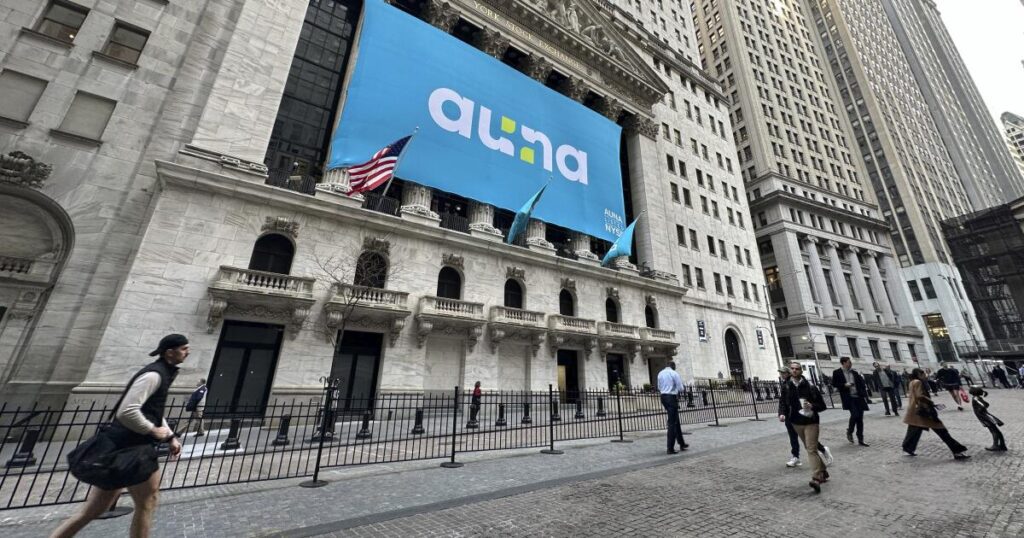A decline on Wall Street sent stocks lower on Wednesday, with fears growing that what looked like a weak spot in the battle to lower inflation is turning into a worrying trend.
The S&P 500 fell 0.9%, with the vast majority of stocks within the index falling. The Dow Jones Industrial Average fell 422 points, or 1.1%, and the Nasdaq Composite Index fell 0.8%.
Treasury yields also jumped in the bond market, adding pressure to the stock market, after a report showed inflation was hotter last month than economists expected. This is the third report in a row indicating that progress in reducing high inflation may falter. This hurts hopes that the disappointing inflation data for January and February may not have been as bad as it seemed, due to some technical reasons.
“There are still embers of inflation here and there in the economy,” said Joe Davis, chief global economist at Vanguard.
For shoppers, this is painful because of the potential for higher prices in the store. For Wall Street, this raises concerns that the Fed will hold back from implementing the interest rate cuts that traders are eager for and betting on.
The S&P 500 had already jumped more than 20% since Halloween, partly due to expectations that the Federal Reserve will cut its key interest rate, which is at its highest level in more than two decades. Such cuts would ease pressure on the economy and encourage investors to pay higher prices for stocks, bonds, cryptocurrencies and other investments.
But the Fed was waiting for more evidence to show that inflation is trending sustainably lower toward its 2% target. After an encouraging slowdown last year, the fear now is that inflation may remain stuck after inflation reports for January, February and March came in hotter than expected, along with data on the economy in general.
“Two data points don't make a trend, but maybe three do,” said Brian Jacobsen, chief economist at Annex Wealth Management.
“If we get another reading like this, the Fed's conversation will shift from when to cut to whether to raise rates.”
Bond, gold and other prices fell immediately after the inflation data was released this morning.
The yield on the 10-year Treasury note jumped to 4.54% from 4.36% late Tuesday and is back to where it was in November. The two-year bond yield, which is moving more thanks to the Federal Reserve's expectations, rose higher, rising to 4.97% from 4.74%.
Traders sharply cut their bets that the Federal Reserve may start cutting interest rates in June. They now see only a 17% chance of making that happen, down from nearly 74% a month ago, according to CME Group's FedWatch tool.
Perhaps more importantly, traders have shifted more bets towards Fed rate cuts only twice over the course of this year. At the beginning of the year, they were anticipating six or more cuts through 2024.
High interest rates reduce inflation by slowing the economy and hurting investment prices. The fear is that leaving interest rates too high for too long could lead to a recession.
Among the biggest losers on Wall Street on Wednesday were real estate investment trusts, utility companies and other companies whose stocks are being hurt more than others by rising interest rates.
Real estate stocks in the Standard & Poor's 500 index fell by 4.1%, suffering the largest loss ever among the 11 sectors that make up the index. This included a 6.1% decline in Boston Real Estate shares, and a 5.3% decline in Alexandria Real Estate shares.
Homebuilders also declined because higher interest rates could dampen the housing industry by making mortgages more expensive. DR Horton fell 6.4%, Lennar fell 5.8%, and PulteGroup fell 5.2%.
In total, the S&P 500 index fell 49.27 points to 5,160.64. The Dow Jones fell 422.16 points to 38,461.51, and the Nasdaq Composite fell 136.28 points to 16,170.36.
Critics were already saying that the US stock market looked too expensive by several measures. They said either interest rates needed to fall or corporate profits needed to rise to make stock prices look more reasonable. The hope on Wall Street is that a resilient US economy can help support profits, even if that dampens hopes for an interest rate cut.
Big US companies are lining up on the runway to report how much they've made in the first three months of the year, and Delta Air Lines helped kick off reporting season by delivering better-than-expected results.
The airline said it is seeing strong demand for flights around the world, and expects the strength to continue through the spring. But it also refrained from raising its full-year earnings forecast. Its stock rose as much as 4% during the morning before turning to a loss of 2.3%.
The banking industry will soon steal the spotlight this earnings season, with JPMorgan Chase and Wells Fargo among the reports on Friday.
On overseas stock markets, indicators were mixed in most parts of Europe. In Asia, stocks rose 1.9% in Hong Kong but fell 0.7% in Shanghai after Fitch Ratings cut its outlook for China's public finances.
Choi writes for the Associated Press. AP writers Matt Ott and Ellen Kurtenbach contributed to this report.
